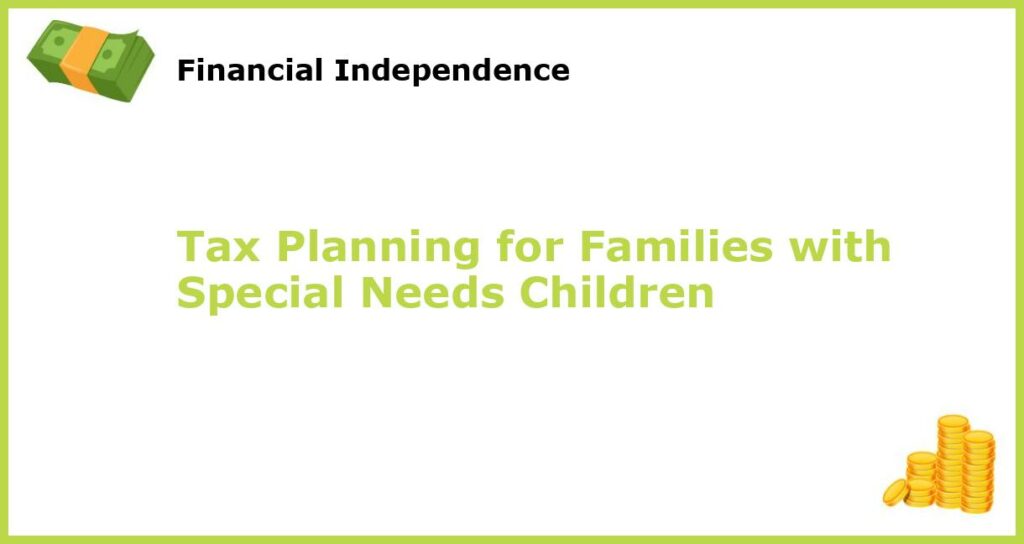Being a parent is already difficult, and when you add the responsibility of taking care of a special needs child, it can become overwhelming. Families with special needs children face unique challenges, including the extra costs of care and the need to ensure their child’s financial security for the future. Understanding tax planning for families with special needs children can relieve some of those challenges.
Understanding Tax Credits and Deductions

Parents of special needs children often face financial challenges associated with their child’s care. However, there are tax credits and deductions available that may help to reduce the financial strain. The Child Tax Credit is a tax credit for parents that have dependent children. It allows parents to claim up to $2,000 per child as a credit when they file their taxes. The Earned Income Tax Credit is also worth considering. It’s a credit that provides a tax reduction or a cash refund to lower-income families.
Medical expenses associated with your special needs child’s care may be deductible as an itemized deduction. It’s important to keep detailed and accurate records of medical expenses, including receipts, invoices, and any other documentation to support your claim. However, to qualify for this deduction, your total deductible medical expenses must exceed 7.5% of your adjusted gross income.
Creating a Special Needs Trust

Raising a child with special needs requires a different type of planning for their future when compared to typical children. Families with special needs children must plan for their long-term financial security. A Special Needs Trust is a type of trust designed to provide financial support to individuals with disabilities without affecting their eligibility for critical government benefits such as Medicaid, SSI, and SSDI. Setting up a Special Needs Trust involves complex legal and financial procedures, alongside selecting the right trustee to administer the trust.
Contributing to a 529 ABLE Account

529 ABLE accounts are federal tax-exempt savings programs that help individuals with disabilities and their families save and pay for qualified disability expenses. Similar to a college savings account, earnings grow tax-free, and qualified withdrawals are tax-exempt. 529 ABLE contributions are not deductible on your federal taxes, but the contributions grow tax-free. Individuals with disabilities must have been disabled before age 26, and the contribution limit varies by state. Families must use funds from the account for qualified disability expenses, including housing, transportation, employment training, and education, among other allowable expenses.
Understanding the Medical Expense Deduction

For families with special needs children, medical expenses quickly add up, and once they exceed 7.5% of your adjusted gross income, they are deductible as an itemized deduction. Medical expenses include doctor’s visits, medication, health insurance premiums paid by the insured, and other qualified expenses such as transportation and lodging, among others. Families with special needs children can also explore what home modifications qualify for the medical expense deduction, which can be vital in ensuring the safety of your child with special needs.
Utilizing the Caregiver Tax Credit

The caregiver tax credit, also known as the Child and Dependent Care Credit, helps families offset the cost of care for their special needs children. Caregiving expenses like daycare, respite care or specialized treatment can be costly, yet this credit allows families to claim up to 35% of these expenses. The maximum amount that can be claimed is $3,000 per year per child, and this credit is also available for qualified dependent adults.
Maximizing Retirement Contributions
Retirement savings are not directly related to tax planning for special needs children, yet these accounts can provide tax advantages that reduce your taxable income. Contributions made to a retirement savings account, such as a 401k, IRA, Roth IRA or SEP IRA, are deductible, tax-deferred and tax-exempt (-later). By contributing to retirement accounts, special needs families may be able to reduce their taxable income, which can help lower your family’s tax bill.
Considering a Flexible Spending Account
Families with special needs children can also contribute funds to a Flexible Spending Account, or FSA. An FSA allows an employee to direct part of their salary to a specific account, and the funds from the account are tax-free. Expenses eligible for reimbursement through a flexible spending account include medical and dependent care expenses associated with disabilities, such as medical devices, therapies, and personal care attendants, among other eligible expenses.
Working with a Financial Advisor
For families with special needs children, it’s necessary to work with financial advisors knowledgeable in tax planning and estate planning. They can help navigate the complexities of special needs tax law and provide targeted financial advice that is designed to fit your family’s specific needs. The advisor should help develop a plan tailored to the family’s goals while also helping to meet the necessary compliance requirements.
Educating Yourself on Tax Law Changes
Educating oneself on tax laws is essential to make informed decisions on tax planning for your family’s future. Understandably, tax laws can be challenging to keep up with, and consulting with a tax professional or reading up on financial news should help you keep up-to-date with any tax law changes affecting special needs families. This information can be beneficial in determining the best course of action for your family’s specific situation.
Maintaining Accurate Records
Maintaining well-organized and accurate records is crucial for tax planning for special needs families. Maintaining records of all medical expenses, caregiving expenses, educational expenses, and any other expenses related to your special needs child is important. These records will help maximize your eligible credits and deductions, lower your taxes, and prevent a potential audit. Organized records simplify the tax preparation process and allow you to benefit from all available tax deductions, credits and other financial incentives.







